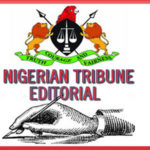While Sir Ronald Leach was Senior Partner of KPMG’s predecessor firm Peat Marwick Mitchell (Chartered Accountants), he was an unrepentant advocate of the sacred duties of chartered accountants and the sanctity of our role as the “conscience of the nation” in exchange for modest rewards. When I joined the firm in London in 1970, chartered accountants were prohibited from advertising their services – with the exception of insertions in the “Yellow Pages” of the Telephone Directory. Sir Ronald was a champion of the common good. Thirty-four years afterwards when I retired as chairman and chief executive of KPMG Nigeria and chairman of KPMG Africa at the age of sixty years without gratuity or pension, it was nevertheless with an amazing sense of gratitude and incredible humility. It was a huge privilege to operate in an environment in which meritocracy and the common good were not in lethal conflict.
However, the Harvard University political philosopher Michael Sandel in his book: “The Tyranny of Merit: What’s Become of the Common Good?” has ignited a vigorous debate regarding whether or not meritocracy is in fact desirable and by extension, how to achieve it. According to him, “The ideal itself is flawed. Meritocracy has a dark side. And the dark side is that meritocracy is corrosive of the common good. It encourages the successful to believe that their success is their own doing and that they therefore deserve the bounty that the market heaps upon them. It leads us to forget the luck and good fortune that helped us on our way. It leads us to forget any sense of indebtedness to those who make our achievements possible, from parents and teachers to community to country. So it generates hubris among the winners. They believe that their success is their own doing and they also believe, implicitly at least, that those who struggle must deserve their fate as well.” Fortunately, Gautama Buddha (5th to 4th century BCE) has provided us with an ancient compass: “Man should accept his past without regrets, handle his present with confidence and face the future with hope and with greater confidence in the faithfulness of God.”That is precisely where the problem is in a nation where those who rule and those who are being ruled are locked in mortal conflict. It is clearly a violent and abusive relationship.
Michael Proust (1871 to 1922) has come to our rescue by reminding us that: “The real voyage of discovery consists not in seeking new landscapes but in having new eyes.” We also have a vignette from George Orwell (1903 – 1950): “During times of universal deceit, telling the truth becomes a revolutionary act.” However, Ralph Waldo Emerson (1803 – 1882) insists that we must not despair. His exhortation is as follows (It is all about “lies” !!): “What lies behind us and what lies before us are tiny matters compared with what lies within us.”
At about the same time as Sir Ronald Leach (of Peat’s) was an ardent advocate of the common good. Sir Arthur Lewis of the London School of Economics delivered his seminal work on the “Dual Economy” – the paradigm that still shapes the way most social scientists think about the economic problems of “less-developed countries.” Its main conclusion is that many less-developed or underdeveloped economies/ecosystems have a dual structure and are divided into a modern sector, which corresponds to the more developed part of the economy, is associated with urban life, modern industry, and the use of advanced technologies. The traditional sector is associated with rural life, agriculture and “backward” institutions and technologies. When Colin Sharman (later Sir Colin Sharman/The Lord Sharman) was Senior Partner/Chairman of KPMG (1997) he pressed firmly on the reset button and came up with a new focus – namely, Chartered Accountants (particularly KPMG) should endeavour to align their services directly with the expectations of their clients with a robust emphasis on adding value. His initial conclusion was that our clients appeared to be more concerned with the future (Risk Assessment/Risk Management within the context of safety of investments and safety of lives and property). He then postulated that KPMG clients would shift their focus from what had already happened – Profit and Loss Accounts and the Balance Sheet to sustainability. The majority of KPMG Partners appeared to be in support. Whatever opposition was brewing was somewhat subdued.
Colin as Chairman of KPMG International went a step further by persuading KPMG International Council (of which I was a member) to fund his project – a team to go round the world and anticipate/predict the future of the emerging global village. His logic appeared to be sound – if you know the future, you can deliver great value by alerting your clients to future challenges and opportunities. I must confess that my role in this laudable endeavour and exciting enterprise was on the fringes. I read the voluminous reports and whatever observations/comments I made were relegated to the footnotes.
To the best of my knowledge, the report did not predict any of the following “Game Changers”: climate Change, the rise of China to Challenge United States of America, Covid-19 pandemic, the emergence and dominance of Amazon in on-line shopping, the emergence of Internet; High Tech; Mobile Phones; Artificial Intelligence; Blockchain and Cryptocurrency (Bitcoin, Ethereum, etc), the Supremacy of Data, the Collapse of Enron and Arthur Andersen, the emergence of Elon Musk, now the richest man in the world thanks to his electric cars (Tesla), the collapse of the Soviet Union, the War in Ukraine, Space travel tourism/private shuttle, Arab Spring, Oil theft (mostly from Nigeria), Advance Fee Fraud (“419”) mostly from Nigeria and the demise of fax machines. Regardless, Colin Sharman deserves kudos for his vision and the vigour with which he pursued it for the common good without compromising the credo of the accountancy profession – chartered accountants are the avatars of public trust. There was no way Colin could have predicted the unification of Western Germany with Eastern Germany or the demise of Kodak which was the star stock on Fortune 500. Suddenly, fabric of society has been invaded by “LGTB” and social media. We must add ZOOM and virtual learning plus working from home (remotely) to the list.
By the time Michael Rake emerged as Chairman of KPMG in 2002 after serving as Colin’s deputy, the new mantra was “Eat what you kill and kill what you eat.” It was a huge cultural change.
Bashorun J.K. Randle is a former president of the Institute of the Chartered Accountants of Nigeria (ICAN).






